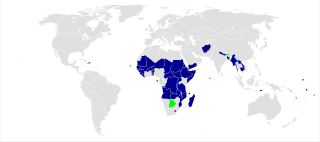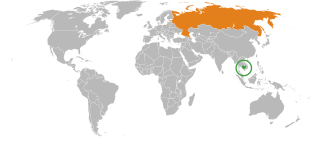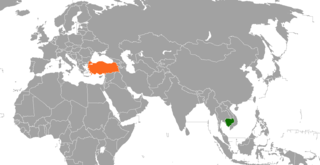Related Research Articles
The history of Cambodia, a country in mainland Southeast Asia, can be traced back to Indian civilization. Detailed records of a political structure on the territory of what is now Cambodia first appear in Chinese annals in reference to Funan, a polity that encompassed the southernmost part of the Indochinese peninsula during the 1st to 6th centuries. Centered at the lower Mekong, Funan is noted as the oldest regional Hindu culture, which suggests prolonged socio-economic interaction with maritime trading partners of the Indosphere in the west. By the 6th century a civilization, called Chenla or Zhenla in Chinese annals, firmly replaced Funan, as it controlled larger, more undulating areas of Indochina and maintained more than a singular centre of power.

Cambodia, officially the Kingdom of Cambodia, is a country located in the southern portion of the Indochinese Peninsula in Southeast Asia. It is 181,035 square kilometres in area, bordered by Thailand to the northwest, Laos to the north, Vietnam to the east and the Gulf of Thailand to the southwest. Phnom Penh is the nation's capital and largest city.

Everything but Arms (EBA) is an initiative of the European Union under which all imports to the EU from the Least Developed Countries are duty-free and quota-free, with the exception of armaments. EBA entered into force on 5 March 2001. There were transitional arrangements for bananas, sugar and rice until January 2006, July 2009 and September 2009 respectively. The EBA is part of the EU Generalized System of Preferences (GSP). The up-to-date list of all countries benefiting from such preferential treatment is given in Annex IV of the consolidated text of Regulation (EU) 978/2012.
A Commerce minister is a position in many governments that is responsible for regulating external trade and promoting economic growth. In many countries, this role is separate from a finance minister, who has more budgetary responsibilities.
The Free Trade Union of Workers of the Kingdom of Cambodia (FTUWKC) is a trade union in Cambodia. It was founded in December, 1996. ICTUR reports that the largest activities of the FTUWKC are in the garment industry.

Cambodia–Russia relations refers to the bilateral relations of Cambodia and Russia. The relations between both countries were strong since the Soviet era. Russia has an embassy in Phnom Penh. Cambodia has an embassy in Moscow. Both countries are full members of the East Asia Summit.

Cambodia–Japan relations are foreign relations between Cambodia and Japan. Japan has an embassy in Phnom Penh. Cambodia has an embassy in Tokyo.

Cambodia–Denmark relations refers to the historical and current relationship of Cambodia and Denmark.

IndustriALL Global Union is a global union federation, founded in Copenhagen on 19 June 2012.

Cambodia–Malaysia relations are foreign relations between Cambodia and Malaysia. Both countries are members of ASEAN. Cambodia has an embassy in Kuala Lumpur, and Malaysia has an embassy in Phnom Penh.

Cambodia and Spain share bilateral and diplomatic relations. Cambodia does not have embassy in Spain, but the embassy in Paris is accredited for this country. There is no diplomatic delegation from Spain in Cambodia. The Spanish Embassy is located in Bangkok, Thailand.

Cambodia–Turkey relations are the foreign relations between Cambodia and Turkey. Diplomatic relations at the legation level were established in 1947 and then to the rank of ambassador in 1959. It was not until 2013, however, that Turkey established a resident embassy in Cambodia's capital, Phnom Penh.
The Cambodian Confederation of Unions (CCU) is a national trade union centre in Cambodia. The centre is politically tied to the opposition Cambodia National Rescue Party (CNRP) and has been denied official recognition several times in the past. The Cambodian Independent Teachers' Association (CITA) and the Free Trade Union of Workers of the Kingdom of Cambodia (FTUWKC) are affiliated with the centre.
The Cambodian Industrial Food Union Federation (CIFUF) is a trade union federation of food, restaurant, tobacco and informal economy workers in Cambodia. The union was established in 2003 and represents 7,345 members in nine local unions. CIFUF is affiliated with CUNIC.
The Farmers Association for Peace and Development (FAPD) is a trade union of farmers in Cambodia. The union was established in 2007 and has 1,633 members in seven communities. FAPD is affiliated with CLC.
The Trade Union Federation Khmer Worker League (TUFKWL) is a trade union of garment workers in Cambodia. The union was established in 2010 and represents 1,589 members in three local unions. The leader of TUFKWL worked with TUFIKEL before establishing the new union. TUFKWL is affiliated with the Cambodia Confederation of Trade Unions.
The Federation of Building and Wood Workers (FBWW) is a trade union of mainly construction workers in Cambodia. The union was established in 2001 and represents 654 members. FBWW is affiliated with the Cambodia Confederation of Trade Unions. The union shares office space with the Cambodian Unions Federation, on which it also depends for financial support.
The Building and Wood Workers Trade Union Federation of Cambodia (BWTUC) is a trade union of mainly construction workers in Cambodia. The union was established in 2009 through a merger of two smaller unions and represents 2,250 members in ten local unions, among them restoration workers at Angkor Wat. BWTUC is affiliated with the Cambodian Confederation of Labour and has received funding from Building and Wood Workers International.
The Cambodian Labour Confederation (CLC) is a national trade union centre in Cambodia. The politically independent centre was formed by C.CAWDU in 2006.
References
- ↑ Vesna Nuon; Melisa Serrano (2010). Building Unions in Cambodia. History, Challenges, Strategies (PDF) (Report). Friedrich Ebert Foundation. p. 82. Retrieved 2021-01-26.